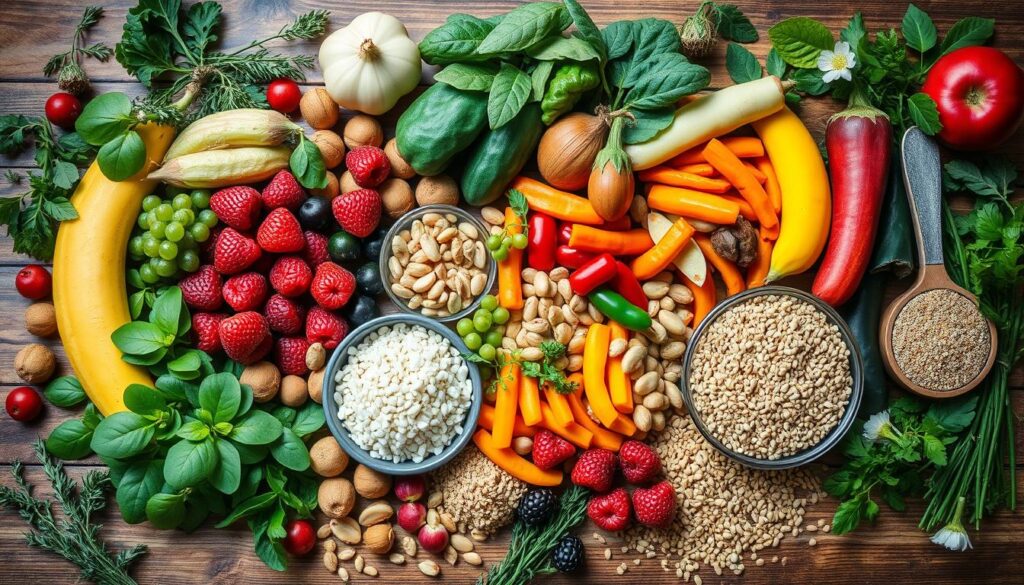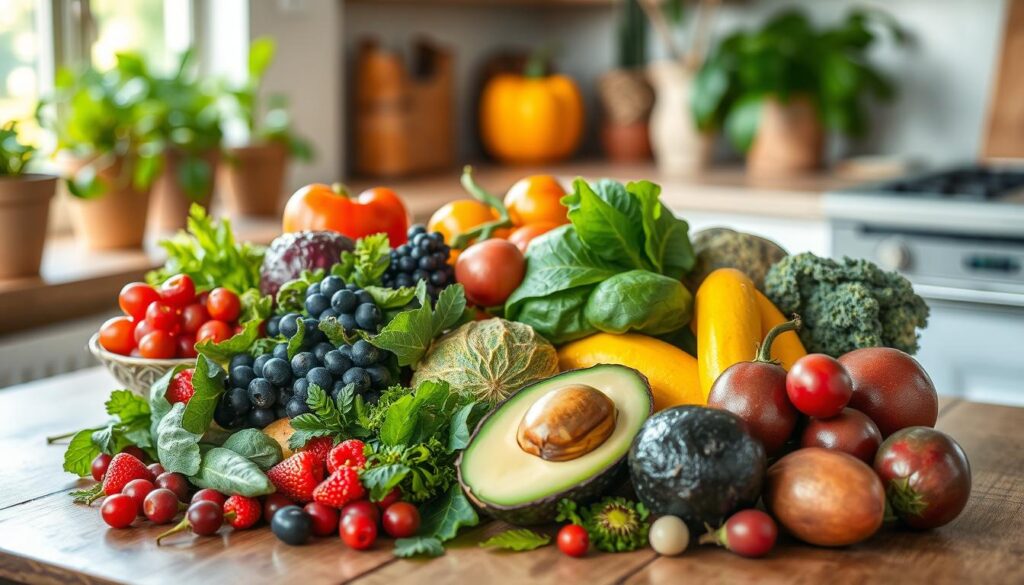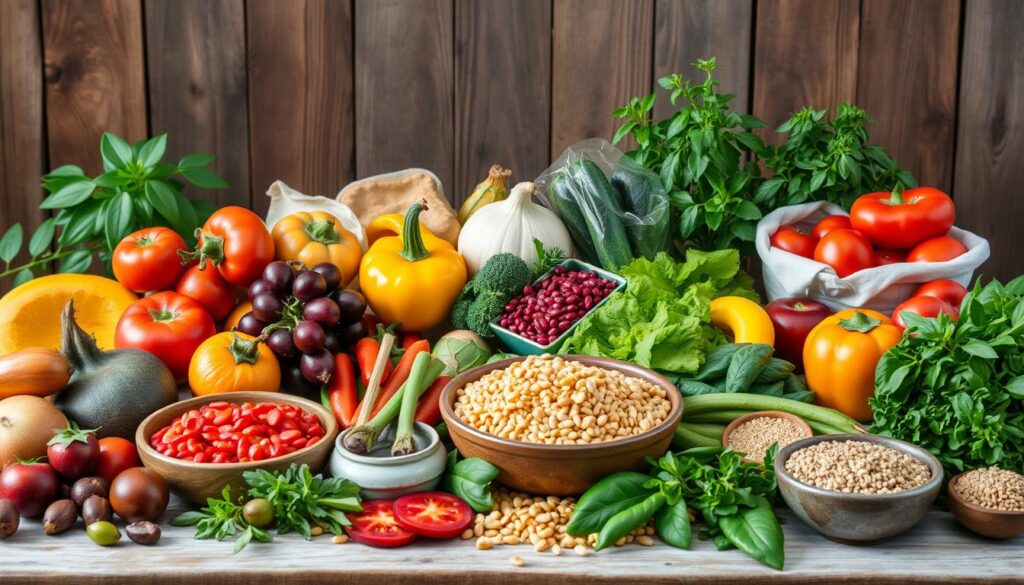Are you curious about the plant-based lifestyle and wondering how it can transform your health? As the world becomes more aware of our food’s impact, more people are turning to plant-based diets. But what is a plant-based diet, and how can it help you? Join us as we delve into the basics, health benefits, and steps to add more plant-based foods to your life.
Key Takeaways
- Discover the different types of plant-based diets and their unique characteristics.
- Understand the key principles and philosophy behind a plant-based lifestyle.
- Explore the remarkable health benefits associated with embracing a plant-based diet.
- Learn how to build a well-rounded, nutrient-dense plant-based diet.
- Gain practical tips for transitioning to a plant-based diet and making it sustainable.
Understanding Plant-Based Diet Fundamentals
Starting a plant-based journey is very rewarding. It’s key to know the different ways and main ideas behind it. Whether you’re interested in whole foods, meatless meals, or ethical consumption, we’ve got you covered.
Different Types of Plant-Based Diets
The plant-based world is wide, from strict veganism to more flexible flexitarianism. Vegans don’t eat any animal products, like meat, dairy, and eggs. Vegetarians don’t eat meat but might have dairy and eggs. Flexitarians mostly eat plants but sometimes have a little animal food.
Key Principles and Philosophy
Plant-based eating focuses on whole foods and simple ingredients. It also cares a lot about the environment. Many people follow it to help animals and the planet too.
Common Misconceptions
Many think meatless meals lack protein or important nutrients. But, a good plant-based diet has everything your body needs. Another myth is that it’s too strict or boring. But, there are so many tasty, creative recipes out there!

“A plant-based diet is not about what you can’t eat, but about all the amazing, wholesome foods you can enjoy.”
Health Benefits of Going Plant-Based
Choosing a plant-based diet is more than a trend. It’s a lifestyle that offers amazing health benefits. You’ll see improvements in heart health and digestion. Plus, you’ll feel more energized and connected to your body.
A plant-based diet can lower heart disease risk. It focuses on whole foods, fiber, antioxidants, and healthy fats. This supports your heart and keeps blood pressure and cholesterol in check. Studies show it can cut heart attack risk by up to 40%.
Plant-based eating also boosts digestion and gut health. Foods like fruits, veggies, and legumes are full of fiber. They help with bowel movements, reduce inflammation, and support a healthy gut. This leads to better nutrient absorption, less bloating, and a stronger immune system.
- Improved heart health and reduced risk of heart disease
- Better digestion and gut function
- Increased energy and vitality
- Reduced inflammation and risk of chronic diseases
- Positive environmental impact through sustainable eating
“Switching to a plant-based diet was one of the best decisions I ever made. I feel healthier, more energized, and more connected to my body than ever before.” – Emily, Nutritionist
Plant-based eating offers more than just physical health benefits. It also helps the environment through vegan nutrition. It’s good for you and the planet!

Ready to see how plant-based eating can change your life? Next, we’ll look at the key nutrients for a healthy plant-based diet.
Essential Nutrients in a Plant-Based Diet
Switching to a plant-based diet doesn’t mean you’ll miss out on important nutrients. In fact, a well-planned plant-based diet can give you all the vitamins, minerals, and healthy fats you need. Let’s look at some key nutrients found in plant proteins, vitamins, and omega-3s.
Plant Protein Sources
Many think you can’t get enough protein on a vegetarian lifestyle. But it’s actually easy. Legumes like beans, lentils, and peas are full of protein. Nuts, seeds, and whole grains also have a lot of protein. By eating a variety of these, you get all the amino acids your body needs.
Vital Vitamins and Minerals
- Leafy greens like spinach and kale are great for iron, calcium, and vitamins A, C, and K.
- Citrus fruits, berries, and bell peppers are full of vitamin C. This vitamin helps your immune system and makes collagen.
- Whole grains, fortified plant-based milks, and mushrooms are good sources of vitamin B12. This is important for those eating plant proteins.
Omega-3 and Healthy Fats
Omega-3 fatty acids are good for fighting inflammation. You can find them in flaxseeds, walnuts, and chia seeds. These plant-based sources are a great alternative to fish oil, perfect for a vegetarian lifestyle. Avocados, olives, and coconut oil are also good. They add healthy fats to your diet.
A well-planned plant-based diet can provide all the essential nutrients your body needs to thrive.
Getting Started with Meat Alternatives
Are you looking to add more plant-based meals to your diet? Missing the meat’s texture and flavor? Don’t worry, we’ve got you covered. The world of meat substitutes offers a variety of tasty options. From savory tempeh to versatile seitan, your taste buds will thank you.
Tofu is a top choice for meatless meals. Made from soy, it can be marinated, baked, or stir-fried. Press and season it to bring out its best.
- Tempeh, made from fermented soybeans, has a nutty flavor and firm texture. It’s great for ground meat substitutes in tacos or chili.
- Seitan, or “wheat meat,” is made from wheat gluten. It can be shaped and seasoned like chicken, pork, or steak. It’s known for soaking up flavors well.
- Jackfruit, a tropical fruit, becomes meat-like when unripe. It’s perfect for meatless pulled “pork” or other savory dishes.
Exploring meat alternatives is all about creativity. Try different cooking methods and marinades to find your favorite. With a bit of creativity, you’ll be making tasty meatless meals in no time!
“The secret to enjoying meat substitutes is to treat them as their own unique ingredients, not just as replacements for meat.”
Smart Shopping for Plant-Based Ingredients
Shopping for plant-based foods can be fun but also challenging. Don’t worry, we’ve got tips to help you shop smart. You’ll learn how to choose whole foods and sustainable options for your meals.
Reading Food Labels
Understanding food labels is crucial for making good choices. Look for products without extra additives, preservatives, and sugars. Choose whole, simple ingredients that fit your plant-based diet. Check the nutrition facts, serving sizes, and any allergens.
Seasonal Shopping Guide
- Choose seasonal, local produce for better taste and nutrition. It’s also cheaper.
- Know your area’s harvest calendar to enjoy fresh produce all year.
- Visit farmers’ markets and CSAs for the best plant-based foods.
Budget-Friendly Options
Healthy, plant-based eating doesn’t have to cost a lot. Look for bulk items, frozen veggies, and store brands. Meal planning and batch cooking can save you money and time.
| Ingredient | Cost per Pound (Conventional) | Cost per Pound (Organic) |
|---|---|---|
| Broccoli | $2.50 | $3.75 |
| Quinoa | $3.99 | $4.99 |
| Lentils | $1.79 | $2.49 |
| Almonds | $6.99 | $8.99 |
By using these tips, you’ll find great plant-based foods that are good for you and your wallet.
Transitioning to Plant-Based Eating
Switching to a vegetarian lifestyle might seem hard, but we’re here to help. We’ll guide you through a smooth transition. Whether you want small changes or a big switch, we’ve got you covered.
Start by adding more vegan nutrition to your day. Try to eat more plant-based foods. Begin with meatless Mondays or new veggie recipes a few times a week.
Embrace the Gradual Approach
Some people like to dive into a plant-based diet right away. But for many, a slow transition is better. Here are some tips to make the switch easier:
- Replace one animal-based meal with a plant-based option each day.
- Try new protein sources like tofu, tempeh, or lentils.
- Find new fruits, veggies, and whole grains you love.
- Try plant-based dairy and egg substitutes for your favorite foods.
Surround Yourself with Support
Changing your diet can be tough, but you don’t have to face it alone. Get support from friends and family, or join a plant-based group. Sharing your journey can give you encouragement and new recipe ideas.
The best way to predict the future is to create it.” – Peter Drucker
Remember, going plant-based is a personal journey. Be kind to yourself, celebrate small wins, and adjust as needed. With the right mindset and support, you can make a lasting change to a healthier, more vegan nutrition lifestyle.
Meal Planning and Prep Strategies
Goodbye to mealtime stress, hello to a plant-based lifestyle that’s easy and efficient! We’ve got your back with our favorite meal planning tricks, batch cooking hacks, and smart storage solutions. Get ready to save time, reduce food waste, and always have a delicious meatless meal at your fingertips.
Weekly Menu Templates
Planning your meals doesn’t have to be a chore. Try our convenient weekly menu templates to streamline your plant-based cooking. These customizable guides make it a breeze to map out your meatless meals, ensuring you have a balanced mix of meatless meals and plant proteins throughout the week.
Batch Cooking Tips
- Embrace the power of batch cooking! Prepare larger portions of your favorite plant-based dishes and store them in the fridge or freezer for quick and easy reheating.
- Focus on versatile recipes that can be repurposed in multiple ways, like roasted veggies, grain bowls, and bean-based casseroles.
- Set aside a few hours on the weekend to chop, cook, and package your meals for the week ahead.
Storage Solutions
| Storage Method | Best for | Tips |
|---|---|---|
| Airtight Containers | meatless meals, plant proteins | Label with contents and date, stack for maximum fridge/freezer space. |
| Reusable Silicone Bags | meatless meals, plant proteins | Great for portion control and easy freezing/thawing. |
| Glass Jars | meatless meals, plant proteins | Transparent for visibility, stackable, and can be used for both fridge and freezer. |
With these mealtime strategies in your arsenal, you’ll be a plant-based prep pro in no time. Happy cooking!
Plant-Based Diet for Different Life Stages
Our bodies change a lot as we grow older. From being pregnant to getting older, it’s key to adjust our diet. A plant-based diet can be great at any age.
Nourishing Pregnancies
Expectant mothers can get all the nutrients they need with a vegetarian lifestyle. It’s important to focus on protein, iron, calcium, and omega-3s. These are found in plant-based foods.
Energizing Childhood and Adolescence
Kids and teens grow fast. A vegan nutrition helps them build strong bones and muscles. Foods like soy, nuts, seeds, and leafy greens are great for them.
Thriving in the Senior Years
As we age, a plant-based diet helps keep muscles strong and blood pressure in check. It also lowers the risk of heart disease and diabetes. Foods high in fiber and antioxidants are best for aging well.
“A well-planned vegetarian lifestyle can meet all of our nutritional needs at every stage of life.”
Changing your vegan nutrition to fit your life stage can make you healthier. With the right advice, you can easily add plant-based foods to your diet. This way, you can enjoy many health benefits.
Managing Social Situations and Dining Out
Living a plant-based life doesn’t mean you can’t enjoy social events or eat out. A bit of planning and a positive attitude can help you fit in while sticking to your values. This way, you can enjoy socializing and dining out while staying true to your choices.
Restaurant Navigation Tips
Going out to eat can be easy if you know what to look for. Look for dishes that are mostly veggies, meatless options, and sides you can change up. If you’re unsure about ingredients, just ask your server. They can help make your meal fit your diet.
Social Gathering Strategies
- Bring a plant-based dish to share. This way, you’ll have something tasty to eat too.
- Tell the host about your diet and suggest places to eat. It’s okay to ask for help.
- Remember, it’s about the people you’re with, not just the food. Your choice to eat plant-based is personal.
Travel Considerations
Keeping up with a plant-based diet when traveling can be tough, but it’s doable. Look up restaurants and stores in your destination before you go. Also, bring some snacks that won’t spoil. Try new foods that fit your values and enjoy exploring local plant-based options.
| Dining Situation | Plant-Based Strategies |
|---|---|
| Dining Out | Scan the menu for veggie-forward dishes, request modifications, and communicate your needs to the server. |
| Social Gatherings | Offer to bring a plant-based dish, suggest suitable restaurant options, and focus on the company rather than the food. |
| Traveling | Research local plant-based options, pack non-perishable snacks, and embrace new dishes that align with your values. |
The secret to enjoying social events and eating out while following ethical consumption and sustainable eating is to stay positive and flexible. A little planning and talking can help you enjoy good food and company without giving up your values.
Using Food Scan Genius for Plant-Based Living
Exploring plant-based eating just got easier with the Food Scan Genius app. This tool is your new ally for a healthier, greener plant-based diet.
Just scan a product’s barcode with Food Scan Genius. It quickly checks the ingredients and shares important info. No more struggling with tiny labels or guessing about dairy alternatives. This app makes choosing wisely easy.
- Quickly identify if a product is suitable for your plant-based lifestyle
- Discover hidden animal-derived ingredients that may be lurking in processed foods
- Access detailed nutritional information to ensure you’re getting the essential nutrients you need
But Food Scan Genius does more than that. It also offers tasty plant-based recipes, shopping lists, and dining guides. Goodbye to the guesswork, hello to easy plant-based living.
| Feature | Benefit |
|---|---|
| Barcode Scanning | Instantly access ingredient and nutrition information |
| Recipe Inspiration | Discover delicious plant-based meal ideas |
| Restaurant Navigation | Find plant-friendly dining options with ease |
So, what are you waiting for? Download Food Scan Genius today. It will be your reliable guide on your plant-based diet journey. Enjoy simpler shopping, worry-free dining, and lots of tasty, healthy finds.
Conclusion
You’ve made it! We’ve looked at the benefits of a plant-based diet. These include better health and helping the planet. Every step towards a plant-based lifestyle is important.
Adding more fruits, veggies, and whole grains to your meals is a great start. It’s also about trying out tasty meat alternatives. You’re making a positive change for yourself and the environment.
The plant-based movement is about nourishing our bodies and the planet. By choosing this diet, you’re improving your health and helping the future. It’s more than a trend; it’s a way to make conscious food choices.
As you keep going on your plant-based journey, you’re joining a community that cares. Whether you’re new or experienced, every meal is a chance to nourish yourself and support a better food system. Here’s to a healthier, more sustainable future – powered by plants!
FAQ
What is a plant-based diet?
A plant-based diet focuses on foods from plants like fruits, veggies, whole grains, and nuts. It often excludes animal products like meat, dairy, and eggs.
What are the different types of plant-based diets?
There are many types, like veganism (no animal products), vegetarianism (no meat but okay with dairy and eggs), and flexitarianism (mostly plants with some animal foods).
What are the key principles and philosophy behind plant-based eating?
Plant-based diets focus on whole foods, care for the planet, and animal welfare. It’s about health and well-being in a holistic way.
What are some common misconceptions about plant-based diets?
Some think plant-based diets lack protein or are too expensive. We’ll clear up these myths and share the truth about plant-based nutrition.
What are the health benefits of adopting a plant-based diet?
Plant-based diets can lower the risk of heart disease, diabetes, and some cancers. They also boost digestion, energy, and overall health.
Where can I find plant-based protein sources?
You can find protein in legumes, tofu, tempeh, nuts, seeds, and whole grains like quinoa and oats.
How can I ensure I’m getting all the necessary vitamins and minerals on a plant-based diet?
Eating a variety of whole plant foods will help you get all the vitamins and minerals you need. We’ll guide you on the best foods for your diet.
What are some popular meat alternatives for plant-based eating?
There are many tasty meat alternatives like veggie burgers, plant-based ground “meat,” and sausages. They make it easy to eat less meat.
How can I read food labels to make informed plant-based choices?
Learning to read labels is key for plant-based eaters. We’ll teach you how to spot important ingredients and understand nutrition facts.
What are some budget-friendly plant-based ingredients I can incorporate?
Affordable staples include beans, lentils, frozen veggies, whole grains, and seasonal produce. We’ll help you eat well without breaking the bank.
How can I gradually transition to a plant-based diet?
Switching to plant-based eating can be done gradually. We’ll share tips on adding more plant-based meals and finding recipes you’ll love.
What are some helpful meal planning and prep tips for plant-based eating?
Good meal planning and prep are essential for a plant-based lifestyle. We’ll share our favorite menu templates, batch cooking tips, and storage solutions.
How can I adapt a plant-based diet for different life stages?
We’ll guide you on how to adjust your plant-based diet at every stage of life. Whether you’re young, old, or in between, we’ve got you covered.
How can I navigate social situations and dining out while following a plant-based diet?
Eating out or with friends doesn’t have to be hard on a plant-based diet. We’ll give you tips for dining out, social gatherings, and traveling.
How can the Food Scan Genius app help with plant-based living?
The Food Scan Genius app is a great tool for plant-based eaters. It helps you scan barcodes, check ingredients, and make smart food choices. We’ll show you how to use it to make your shopping and dining easier.






1 Comment
[…] budget-friendly strategies to make vegan shopping more […]